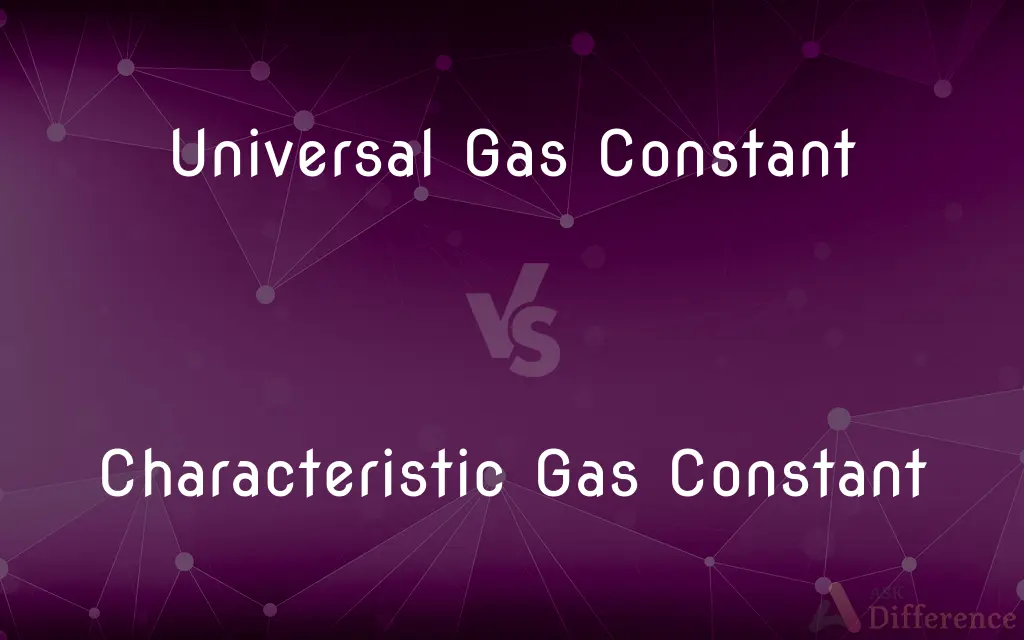Universal Gas Constant vs. Characteristic Gas Constant — What's the Difference?
By Tayyaba Rehman — Published on January 30, 2024
The Universal Gas Constant is a constant for all ideal gases, used in the ideal gas law, while the Characteristic Gas Constant is specific to a particular gas, varying based on its molecular weight.

Difference Between Universal Gas Constant and Characteristic Gas Constant
Table of Contents
ADVERTISEMENT
Key Differences
The Universal Gas Constant (R) is a constant value used in the equation of state for an ideal gas, represented in various units, commonly J/(mol·K). In contrast, the Characteristic Gas Constant (R-specific), also known as the individual or specific gas constant, is unique to each gas and is derived by dividing the Universal Gas Constant by the molar mass of the gas.
R is crucial in the ideal gas law (PV=nRT), linking pressure, volume, temperature, and the amount of gas. Whereas R-specific is used in equations tailored for a specific gas, such as PV=mR-specificT, where m is the mass of the gas.
The Universal Gas Constant provides a consistent value that applies to all ideal gases, facilitating calculations in chemistry and physics. In contrast, R-specific, being dependent on the molecular weight of a gas, varies and thus provides more precise values for calculations involving a specific gas.
In practical applications, R is used for general gas law calculations, making it fundamental in various scientific fields. R-specific, however, is more often used in engineering and specialized scientific calculations where the properties of a specific gas are known.
The value of R is universally recognized and constant, while the value of R-specific changes depending on the gas in question, reflecting the intrinsic properties of different gases such as density and molecular weight.
ADVERTISEMENT
Comparison Chart
Definition
Constant for all ideal gases
Specific to each individual gas
Symbol
R
R-specific
Usage
Used in the ideal gas law
Used in specific gas equations
Dependence
Constant value (8.314 J/(mol·K))
Varies with the molecular weight of the gas
Application
General gas law calculations
Calculations for a specific gas type
Compare with Definitions
Universal Gas Constant
The Universal Gas Constant is fundamental in thermodynamics.
R is a staple constant in thermodynamic equations.
Characteristic Gas Constant
The Characteristic Gas Constant is specific to each gas, based on its molecular weight.
For nitrogen, I use its specific R value in my calculations.
Universal Gas Constant
The Universal Gas Constant is a constant in the ideal gas law.
In my chemistry class, we used R to calculate the pressure of a gas.
Characteristic Gas Constant
R-specific is used in specialized gas equations.
In engineering, we often use R-specific for precise gas system calculations.
Universal Gas Constant
The Universal Gas Constant has a value of 8.314 J/(mol·K).
When calculating the energy of a gas, I use R's value of 8.314 J/(mol·K).
Characteristic Gas Constant
The Characteristic Gas Constant reflects the unique properties of each gas.
The R-specific for carbon dioxide is different due to its unique density and molecular weight.
Universal Gas Constant
R is applicable to all ideal gases.
R remains constant regardless of the type of gas used in our experiments.
Characteristic Gas Constant
R-specific varies for different gases, unlike the universal R.
Calculating the energy for oxygen requires its unique Characteristic Gas Constant.
Universal Gas Constant
R is crucial for relating pressure, volume, and temperature in gases.
Understanding the Universal Gas Constant is key to mastering gas laws.
Characteristic Gas Constant
The Characteristic Gas Constant is derived by dividing R by the gas's molar mass.
To find the R-specific for helium, divide the Universal Gas Constant by helium's molar mass.
Common Curiosities
What is the Universal Gas Constant?
The Universal Gas Constant is a constant value used in the ideal gas law for all ideal gases.
What's the value of the Universal Gas Constant?
It's approximately 8.314 J/(mol·K).
How is the Characteristic Gas Constant different?
It's specific to each gas, calculated based on the gas's molecular weight.
Can R-specific be used for any gas?
No, R-specific is unique to each gas and varies accordingly.
Why is the Universal Gas Constant important?
It's essential for calculating relationships between gas properties like pressure, volume, and temperature.
Where is R-specific commonly used?
In engineering and specialized calculations for specific gases.
How do you calculate R-specific?
Divide the Universal Gas Constant by the molar mass of the gas.
Is R used in both chemistry and physics?
Yes, it's fundamental in both fields for studying gases.
What role does R-specific play in engineering?
It's used for precise calculations in gas systems and processes.
How does molecular weight affect R-specific?
Higher molecular weight gases have a lower R-specific value.
Does R change with different gases?
No, R is a universal constant for all ideal gases.
Is the Universal Gas Constant the same in all unit systems?
Its value remains constant, but the units may differ (e.g., J/(mol·K), L·atm/(mol·K)).
Can R be used for real gases?
It's primarily for ideal gases, but with corrections, it can be applied to real gases under certain conditions.
Are both constants used in thermodynamics?
Yes, both are used, depending on whether the focus is on general or specific gas properties.
Why might an engineer choose R-specific over R?
For calculations requiring specific information about a particular gas, R-specific provides more accuracy.
Share Your Discovery

Previous Comparison
Ionic Mobility vs. Ionic Velocity
Next Comparison
Linear Queue vs. Circular QueueAuthor Spotlight
Written by
Tayyaba RehmanTayyaba Rehman is a distinguished writer, currently serving as a primary contributor to askdifference.com. As a researcher in semantics and etymology, Tayyaba's passion for the complexity of languages and their distinctions has found a perfect home on the platform. Tayyaba delves into the intricacies of language, distinguishing between commonly confused words and phrases, thereby providing clarity for readers worldwide.












































